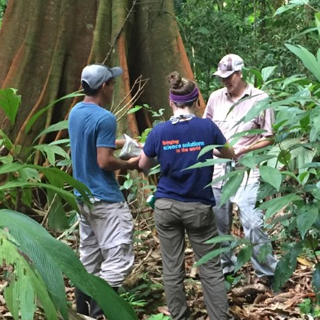Courses I teach
UG NRSM 210N - Soils, Water & Climate
Offered Fall 2015/Spring 2016
An introduction to the physical, chemical, biological and morphological properties of soil, and how they are influenced by climate and hydrology. The course includes both lecture and a field-based laboratory component.
This course is offered every spring, and is co-taught with Drs. Ashley Ballantyne and Kelsey Jencso.
 UG NRSM 408 - Global Cycles and Climate
UG NRSM 408 - Global Cycles and Climate
Offered Spring (even years)
In this course, we will explore the Earth’s major biogeochemical cycles, how they are linked, how they have been altered by human activities, and how they interact with the global climate system. With that as a backdrop, we will then take a close look at a number of proposed climate change mitigation strategies through a biogeochemical lens. Students analyze and compare each of the earth's major global biogoechemical cycles, and evaluate the ways and extent to which each of the of them influences and interacts with the global climate system, and will critically examine a number of potential climate change mitigtion strategies and evaluate their costs, benefits, and potential consequences. Students will demonstrate their understanding through a number of written assignments and exams, and by producing an oral presentation and leading in-class discusions. At the end of the course, students will understand the potential benefits and pitfalls of currently available strategies for mitigating global climate change, and will be able to assess their efficacy, practicality, and potential unintended consequences.
UG NRSM 415 - Environmental Soil Science
Offered Spring (odd years)
Healthy soils provide the foundation for all terrestrial ecosystems. They provide us with the food, fuel and fiber that sustain the human enterprise, filter water, store carbon, cycle nutrients, and perform countless other critical ecosystem functions. However, when people intensively till fields, clearcut or burn forests, mine for energy or minerals, etc, they can damage or destroy topsoil that took centuries, or even millenia, to accumulate. In this course, we will investigate the physical, chemical and biological properties of soils and how they function. After a brief introduction to these basic properties, we will explore a number of soil processes in depth, with the goal of understanding the links between the environment, soils and ecosystems, and how they are being affected by global environmental change. In addition, we will consider a number of contemporary topics including the potential effects of climate change on soils, plant-soil interactions, and the consequences of large-scale biofuel production from biomass on soil processes, among many others. Students will demonstrate learning through a series of exams, oral discussions, an independent project and an independent presentation. At the end of the semester, students will understand soil chemical, physical and biological patterns and processes, soil biogeochemical cycles, and how soils regulate and influence terrestrial ecosystem structure and function.
G BIOS 5532 - Fundamentals of Ecosystem Ecology
Offered Fall
In this course students will consider the defining principles of ecosystem ecology. Ecosystem ecology is somewhat unique in that it considers the flow of both energy and materials through living (e.g., plants, animals, microbes, humans) and non-living (e.g., lithosphere, hydrosphere, atmosphere) components of environments. As such, the course includes material ranging from biophysical and chemical to biological. Using the framework developed by G. Evelyn Hutchinson in his book, The Ecological Theater and the Evolutionary Play, we will begin by examining the “abiotic stage” (e.g., ecosystem water and energy balance, climate, geology and soils) on which the major ecological players perform some truly incredible roles (e.g., primary production, decomposition, nutrient cycling and nutrient use). We will consider a number of fundamental concepts in the field (e.g., succession, disturbance, ecological stoichiometry) then turn our attention to the major element cycles (carbon, nitrogen, phosphorus), what drives them, how fluxes vary in space and time, and what that means for the planet, and we will consider some strategies for managing and sustaining ecosystems. Along the way, we will use a number of specific case studies from the primary literature to help synthesize the information we are covering.
This course is offered every fall, but I generally teach it in odd-numbered years.
G NRSM 594 - Emerging Topics in Ecosystem Science
Offered intermittently
This 1-credit graduate seminar examines a range of contemporary topics in ecosystem science.
Note: Students currently enrolled in my classes can access all course-related materials via Moodle.
